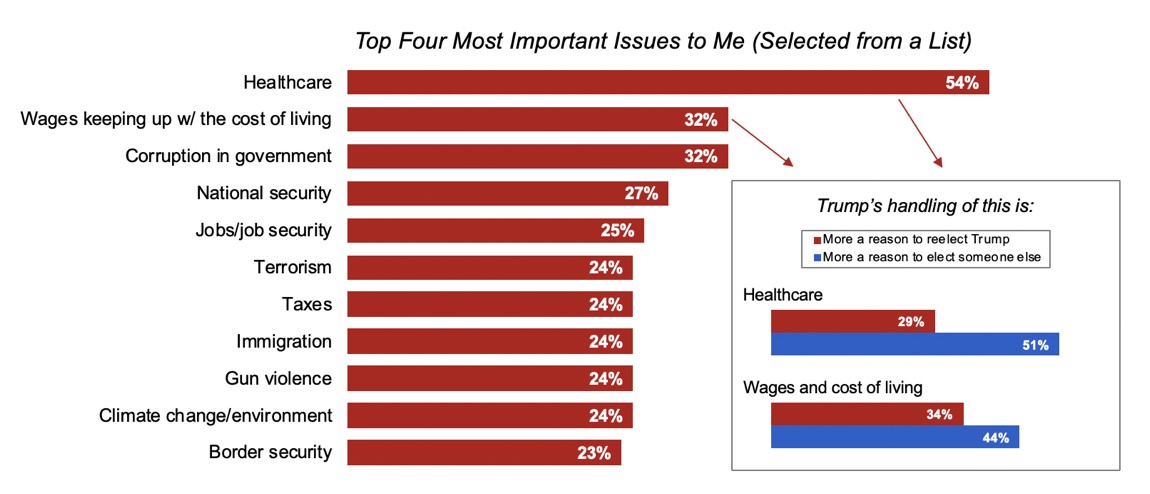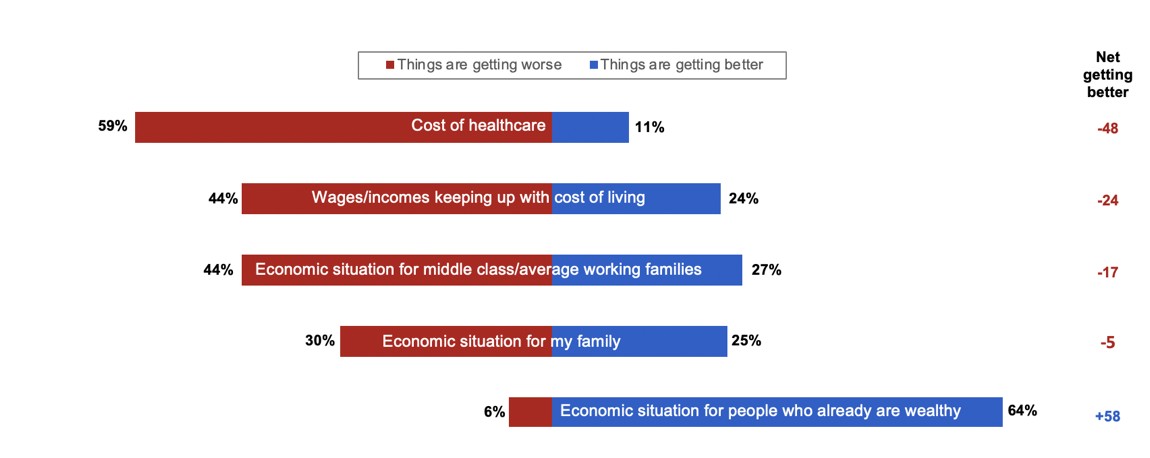New Polling: Democrats Must Exploit Trump’s Economic Vulnerabilities In Critical Swing States
Summary
New polling from Priorities USA shows that Donald Trump faces some steep challenges in the core 2020 battleground states, but Democrats and their allies must continue reminding voters how Trump has failed them on the issues that are most important to them – health care and other economic issues. Voters in Michigan, Wisconsin, Pennsylvania and Florida side with a Democrat over Trump in 2020 and give Trump poor ratings on the issues most important to them. Trump has made it clear that his top political priority is to motivate his core supporters, but the opposition to Trump’s reelection is more unified than his support. In fact, Trump’s ‘very unfavorable’ number is higher (41%) than his total ‘favorable’ number (40%) showing the entrenched opposition Trump must overcome. Further increasing Trump’s challenges, the issues that Trump uses to motivate his base (immigration, border security and taxes) are cited by a plurality of voters as a reason to vote for somebody else.
Health care remains the dominant issue for voters across the political spectrum, and on that issue 51% view it as a reason to vote for someone else while just 29% view it as a reason to re-elect.
While voters say that health care is the most important issue for them, they’re not hearing about it at all.
When asked what they’ve heard recently that makes them feel more or less favorable about Trump, health care is nowhere to be found. Those that say they’ve heard something favorable cite Trump’s efforts to build the wall and the economy. Those that say they’ve heard something less favorable cite his tweets, lies and temperament. The fact that voters are not hearing about health care and other economic issues – despite the fact that they rate those issues as the most important to them and where they view Trump unfavorably – is a glaring reminder that Democrats and their allies must be driving that contrast themselves. Voters will not hear about Trump’s disastrous record on health care – rising costs and fewer covered while insurance and pharmaceutical companies enjoy huge new tax breaks – unless Democrats force the issue.
Key Issues
2020 will be an election where pocketbook issues and the difficulties people face in keeping up with the cost of living will be front and center – and no pocketbook issue is as important as the cost of health care. Health care is far and away the most important concern for voters in battleground states and is even the top concern among Trump voters and independents. And the issue that’s most important to voters is also the most compelling reason for voters to oppose Trump. By 51% to 29%, voters say Trump’s handling of health care is a reason to vote for someone else, rather than reelect him. Among undecided voters who broke for Trump in 2016 by 56% to 29%, the split is even more stark. Undecided voters said health care was a reason to reelect someone else over Trump by a margin of 52% to 17%.

Notably, “corruption in government” is one of the top three issues for voters. This strongly suggests that continued oversight and investigations by Congress are very important and the Republican spin that the American public doesn’t care or will punish Democrats for continued investigations is a baseless argument meant to undermine Congress’ critical oversight responsibilities.
And even on issues that Trump is committed to focusing on (taxes, immigration, border security) more voters say those issues are a reason not to vote for him than re-elect him. Even on his strongest issues, the economy and jobs, Trump is at parity with an opponent, with nearly equal groups of voters split on whether his handling of the economy and jobs is a reason to vote for him or elect someone else. And in the key battleground states of Michigan, Wisconsin, and Pennsylvania, where Trump needs his economic message to resonate, only 39% of voters say the economy is a reason to re-elect him.
Drilling down on the economy
Democrats will win the election if it is a fight about the economy. Trump is relying on the message that millions of new jobs have been created in the past few years and the stock market is at a record high. Unfortunately for him, that message fails badly (36% to 64%) when put up against the message that wages are not keeping up with the cost of living and the cost of health care is skyrocketing.
Voters just aren’t feeling what Donald Trump is selling. He constantly raves about overseeing the greatest economy ever, but that’s out of touch with the reality for many voters. Many voters see things getting worse economically on a range of key issues.

Only 38% of voters say they can pay their bills and obligations and have money to put aside for savings. Another 38% say they can pay their bills but can’t save, 17% say there are some months when they struggle to pay their bills and 7% say they are falling behind financially, falling into debt to pay their monthly bills. Among these voters, the only group that Trump currently wins are those who have enough money to pay their bills and save, the rest would support a Democrat in 2020.
And voters largely don’t think Trump is helping. When asked how much they have personally benefited from Trump’s economic policies, 63% say just a little or not at all versus 37% who say they have benefitted some or a lot.
It is important to understand what economic pain points voters are dealing with. Of those we tested, medical expenses, the ability to save for retirement and the ability to handle an emergency top the list. Losing money in the stock market is last, reinforcing the fact that for many voters the stock market should not be considered to be a good indicator of financial well-being, and that Trump’s focus on the stock market is disconnected from voters’ every day lives.
Immigration
Donald Trump has focused much of his time as a candidate and then president on the issue of immigration. The issue is one of the top reasons his supporters cite for wanting to re-elect him, and it is covered nearly non-stop by the press. It’s far worse for Trump than conventional wisdom would suggest.
As noted above, 50% of voters cite immigration as more of a reason to vote for somebody else over Trump versus 41% who say it is a reason to vote for him. Only 34% of undecided voters cite immigration as a reason to re-elect Trump versus 46% who say it is a reason to support somebody else who will have a different approach.
Trump’s border messaging is not helping. In a split sample exercise, a plurality of voters agree that Trump is either manufacturing a crisis at the southern border to distract from other issues and help himself politically or is contributing to the problems on the southern border and making things worse rather than trying to address and solve a real crisis that exists on the southern border.
Immigration may be important to keeping Trump’s base together, but it hurts him with the broader electorate and will not solve his electoral challenges.
What are voters hearing?
Political advertising does not occur in a vacuum. Democrats must be cognizant of the other messages that voters are seeing and hearing and complement or combat those messages accordingly. A majority of voters (51%) say that what they have seen or heard about Trump lately makes them feel less favorable toward him while about a quarter (26%) say it has made them feel more favorable toward him.


This makes it clear that the message Trump is driving is successfully being remembered by his supporters, even if data shows that the message isn’t working with other groups of voters. Democrats are being less successful on this front. The messages most often cited by voters as making them feel less favorable toward Trump are also rooted in his actions and proactively driven messages like the border wall. The economy, health care and wages are nowhere to be found in the atmosphere voters live in. This is a harsh reminder that without Democratic advertising to carry it, voters will never hear our most effective messages. Voters don’t like Trump’s temperament but his omnipresence ensures that voters will continue to be inundated without Democrats doing a thing.
About This Poll
These findings are based on a survey of 1,600 registered votes in Florida (500 interviews), Michigan (400 interviews), Pennsylvania (400 interviews), and Wisconsin (300 interviews). The interviews were conducted online between May 1 and May 8. The samples were structured so that the completed interviews would be representative of the electorates in each state based on both demographic and political factors. The states were weighted together based on their number of electoral votes. Across the four states, the party identification of respondents is 45% Democrat and 41% Republican. Of those who report they voted in 2016, 48% say they voted for Donald Trump and 47% say they voted for Hillary Clinton.